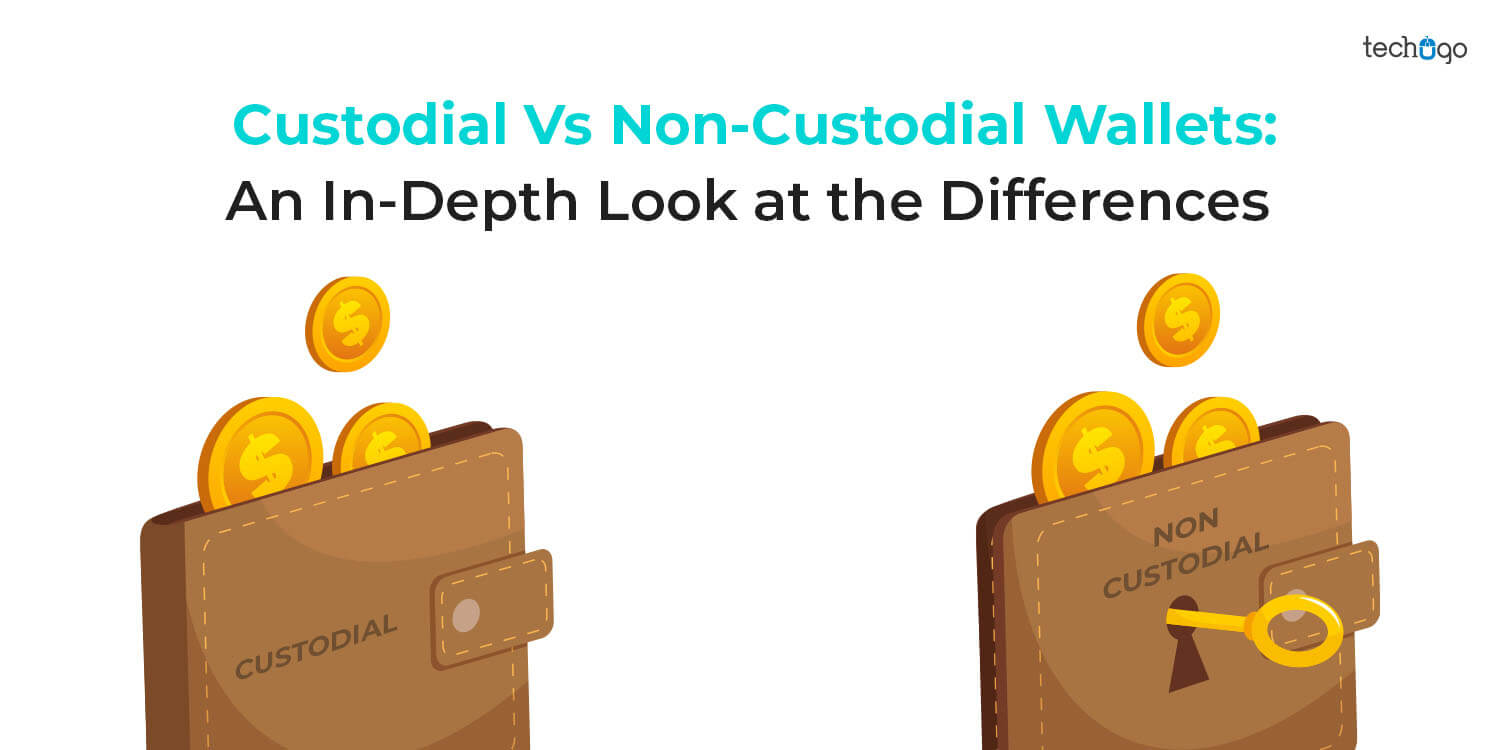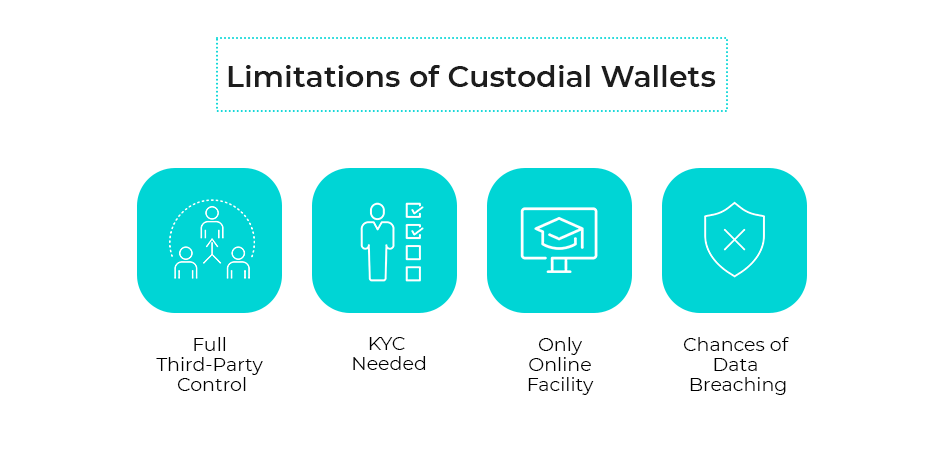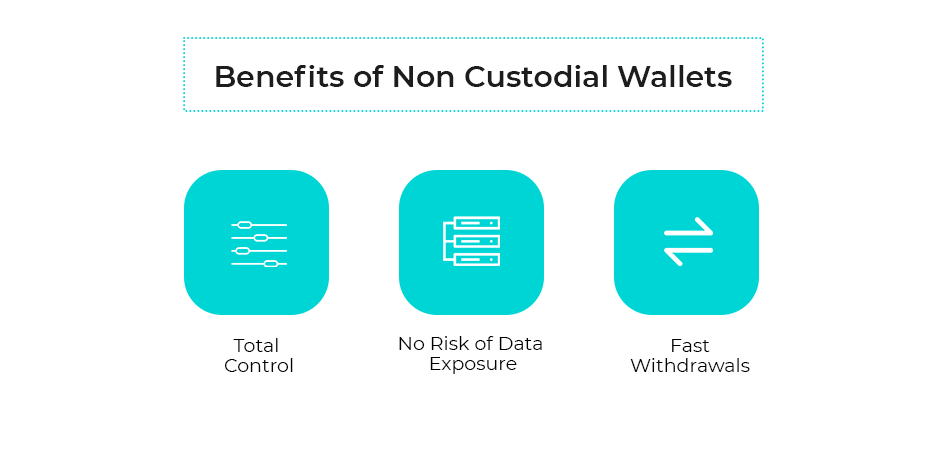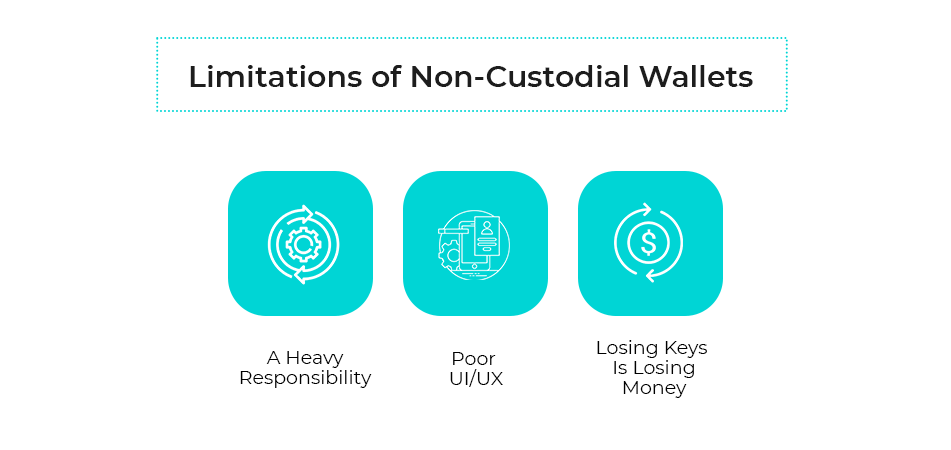20 Oct 2022
Updated on December 29th, 2022
Custodial Wallets Vs Non-Custodial Wallets: An In-Depth Look at the Differences

With the advent of blockchain technology, there’s a technical revolution throughout the world. It has changed the world of technology by creating futuristic services. And with the evolution of blockchain, we have come across digital money i.e. cryptocurrency.
In no time, the way cryptocurrency is gaining popularity worldwide. It won’t be wrong to believe that it has a promising future. People have been inclined to invest in cryptocurrency to explore the future of possibilities.
Now, with trading and exchanging cryptocurrency, we can face the need for crypto wallets to store funds and assets.
Since the talk of cryptocurrency wallets has started, custodial wallets and non-custodial wallets will be the highlight. These digital wallets store crypto. However, both have distinct features.
And being into cryptocurrency, it is imperative to understand everything about these wallets. Thus to let you know every nook and cranny of crypto wallets, this article has brought you all information.
Be it custodial or non custodial wallets; you will find each and every little detail that can help you to choose the best crypto wallet for business. There is a slight difference between custodial and non custodial wallet. So, without thinking much, start reading the information.
Crypto Wallets: Definition and Types

In any situation, the desire to participate in the rapidly developing crypto landscape is undeniable. In this tech-driven era, obtaining cryptocurrency is accessible by using various techniques, like buying it through an exchange. Additionally, people might receive cryptocurrency as remuneration for their work or as a bonus for performing tasks like mining or staking.
For instance, a centralized exchange like Binance lets you buy Bitcoin. However, as long as you have a external crypto wallet for securely holding your crypto assets, it doesn’t matter where you got them from. A crypto wallet creates a distinctive address to find your assets on the blockchain.
Using two separate types of keys; such as public and private keys, crypto wallets secure your cryptocurrency. The public key is sharable with anyone. However, the private key functions more like a password to lock your assets securely. You must protect the private key, which grants access to all of your digital assets and tokens, must be protected at all costs.
In addition, there are two types of wallets, custodial and non-custodial, depending on the level of security for your money. Moreover, to choose the best option for your cryptocurrency endeavors, carefully consider their distinctions.
To assist you in making the best decision for choosing a crypto wallet, here is a detailed description of each type of wallet. Consequently, you can find a comparison of custodial wallets vs non-custodial wallets based on some specific factors.
What Is a Custodial Wallet?

Undoubtedly, custodial wallets come into the limelight as the talk about the difference between custodial wallets and non-custodial wallets starts. The term “custodial” makes it quite clear that these wallets would take custody of something. Simply put, best crypto custodial wallets are cryptocurrency wallets that hold users’ private keys in trust. As a result, on behalf of the user, the wallet providers hold power over the latter’s funds. Custodial wallets are the most common and the first choice of newcomers like Coinbase.
One of the most important benefits of custodial wallets for novices is their simplicity. You don’t need a high level of cryptocurrency technical expertise to use a custodial wallet crypto. Enter your email and password to create an account, then sign in to the custody wallet. However, in the case of custodial wallets, you must entrust the wallet provider with the custody of your money.
It’s crucial to consider that the entire purpose of cryptocurrencies is to give you total control and ownership over your money. Contrarily, custodial cryptocurrency wallets obscure cryptocurrency’s core purpose by taking access from the wallet owners. Moreover, with a custodial wallet crypto, you don’t actually invest in a decentralized digital currency.
It is important to understand that you hand over your fund security to another entity in a custodial wallet. While renowned custodial wallet providers don’t steal users’ funds, accessing your wallet is impossible if it locks you out. It raises questions about the credibility of custodial wallets, as sometimes, wallet providers may lock out the users without prior notice.
Custodial Wallet: Benefits and Limitations
Benefits of Custodial Wallets

Fast And Free Transactions
Unlike the other wallets, there is no transaction fee associated with custodial crypto wallets. It provides an entirely free-of-cost wallet ecosystem that is easy to use. With this, you can experience saving considerable money annually and make transactions without paying any charges.
Excellent UI/UX
Crypto custodial account wallets give you a high-end user experience to access your wallet without hassle. Regardless of experience with cryptocurrency, one can use the wallets through easy navigation. And it is a piece of cake to find whatever you anticipate in your wallet.
Maximum Backup Chances
As mentioned earlier, a third party manages your custodial wallets that secures your fund and private key. It creates a backup option for your transaction, as the exchange authority is responsible for the transaction. It is possible to restore or undo a transaction with the help of the custodial wallet service provider.
Private Keys Regain Access
In case you lose the private key of your wallet, the exchange authority can help you regain access. Nevertheless, custodial wallet users encounter authority problems over their wallets. Third-party is helpful to access their account as the wallet providers control your wallet.
Limitations of Custodial Wallets

However, it seems simple and easy to access your cryptocurrency with a custodial wallet; it snatches all your authority over your wallet. Be it good or bad for a newbie, here are some limitations that you face with your custodial wallets:
Full Third-Party Control
You lose control over your cryptocurrency and private keys with a custodial wallet. The custodial party oversees your every transaction. Also, the third party controls the operations of funds and can freeze your funds stored in the wallet.
KYC Needed
To access your own funds and assets, you need to complete KYC for your custodial wallets. To start any crypto transactions, you need to verify your identity by giving the required documents. Moreover, it violates the anonymity concept if it requires proof of identity to operate.
Only Online Facility
You can’t access your custodial wallet without an active internet connection. In case of emergency, you can’t access your crypto wallet if there is no internet connection. Thus it will be challenging for you to use your custodial wallet from somewhere you can’t find proper internet connectivity.
Chances of Data Breaching
When you use custodial wallets, it stores funds in cold and hot wallets. However, such wallets are not easy to hack, still prone to data breaching.
Top 5 Custodial Wallets
- Binance
- Bitgo
- BitMex
- Blockchain.com
- Free Wallet
What Is a Non Custodial Wallet?

The setbacks for custodial wallets turn out the advantages of non-custodial wallets. Since non-custodial crypto wallets are an alternative to custodial wallets, non custodial wallets are an apt example of decentralization. Usually represented as a decentralized wallet are crypto wallets, entrusting users with private keys. Unlike custodial wallets, in this, the user possesses control over private keys. In addition, only users have the authority to access crypto stored in the best non custodial crypto wallets. It clearly specifies the ownership of the user on the held funds and assets. This way, the wallet ensures improved security of your cryptocurrency.
While there are some advantages with non custodial wallets, it comes with a critical condition. The user must have a basic understanding of restoring and backing up wallets. Additionally, if you use the best non custodial wallet, you must take complete responsibility for the security of cryptocurrency. Since the wallet user is responsible for the security of their private keys, they must understand how to back up a wallet securely is necessary.
In most circumstances, the private key consists of a 12- to 24-word recovery phrase. And it is important for users to keep the recovery phrase in a safe place. For instance, write on paper or type in notes on your device, but make sure to keep them safe in a safe place.
The recovery phrase helps you to regain access to your wallet in situations when you lose access. Moreover, anyone can use their non-custodial crypto wallet using the recovery phrase. Therefore, it is important to consider using a non-custodial crypto wallet to store your cryptocurrency. Thus, do not share it with anyone.
Non-Custodial Wallet: Benefits and Limitations
Benefits of Non-Custodial Wallets

You can make use of a fantastic range of benefits from Non-custodial wallets, which are as follows:
Total Control
People who have begun investing in cryptocurrencies and don’t like having a third party oversee their assets must use non custodial crypto wallets. Additionally, users benefit from a non custodial wallet’s full control over the funds and private keys, providing the optimal user experience.
No Risk of Data Exposure
No intermediary implies that no one will get your information or who you are (complete anonymity). Therefore, there is no chance that the funds or other information can be exposed and misused.
Fast Withdrawals
The crypto non custodial wallets simplify the asset withdrawal procedure. Since a third party plays no part in carrying out the transactions, the process is quick.
Limitations of Non-Custodial Wallets

Cons Of Non-Custodial Wallets
With the opportunity to handle your wallet to store cryptocurrency, you face a few challenges. Here are some of the limitations you face with your non-custodial crypto wallets:
A Heavy Responsibility
The user is in charge of everything, including keeping the keys in a secure place. A minor error can result in a larger financial loss. Whether you keep your private keys on your desktop or in a hardware wallet, theft can occur anywhere.
Poor UI/UX
When it comes to providing a high-quality user interface, non custodial wallets are not the greatest. The wallet’s interface may be challenging for users.
Losing Keys Is Losing Money
The only method to recover your wallet is using your private keys. There is no way to acquire access if you lose your private key. Your wallet may log you out, which could lead to a financial catastrophe.
Top 5 Non-Custodial Wallets
- Electrum
- Ledger Nano X
- Trezor One
- Wasabi
- Zengo
Custodial Wallets Vs Non-Custodial Wallets: Key Differences
| Criteria | Custodial Wallets | Non-custodial Wallets |
| Fund Access | Control of private keys is in the wallet provider, which means they can also access the user’s funds. | No one else can access your wallet and fund. You get complete control of your wallet. |
| Fund Recovery | Easy options for recovery if you lose access to login credentials for the wallet. | If you lose private keys or recovery phrases, there’s no way to recover funds from your wallet. |
| Security | As it is connected to the internet, it is prone to hacking by online invaders. | Cyber attacks won’t be affected without internet connections. However, keeping the private keys and recovery phrases secure is essential. |
| Accounts Creation | Long KYC and AML procedures might be exhausting for a user to create accounts. | Simple and straightforward account creation. No KYC and AML are needed. |
| User Friendliness | Very interactive interfaces that make using custodial wallets easy and convenient. | Technical understanding is a must for non-custodial wallets that reduces user-friendliness. |
Which Cryptocurrency Wallet is Good to Pick to Keep Your Digital Assets?
Crypto wallets are ideal for storing your valuables, depending on your circumstances and requirements. The crypto wallet should support the type of cryptocurrency you want to store and trade. Additionally, the wallets must update from time to time to fit your needs. Famous non custodial wallets to hold cryptocurrency assets include MetaMask, MathWallet, and TrustWalklet. But always remember that a non-custodial wallet is best if you want to communicate with the DeFi applications.
So, pick a external crypto wallet that can fulfill your requirements and is up to date. Moreover, if you find it challenging to choose the right crypto wallet for your needs, Techugo is here. Connect with the blockchain experts by filling out the contact form or dial the number to get immediate assistance.
Don’t forget to drop your feedback in the comment section!
Happy trading!
Get in touch.
Write Us
sales@techugo.comOr fill this form















